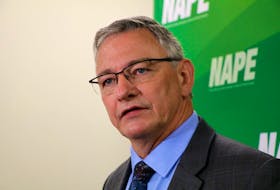ST. JOHN'S, N.L. — Just because Thomas O'Grady was the registered owner of computers that may have been used to download child pornography doesn't mean someone else in his house wasn't responsible for doing it, a former Mountie testified in provincial court Thursday.
Scott Frankland, a retired RCMP officer specializing in computer forensics and internet crimes, was back on the witness stand at O'Grady's trial in St. John's.
Answering cross-examination questions from prosecutor Paul Thistle, Frankland said although there is evidence to show a jump drive containing images of child pornography that had been found in O'Grady's bedroom had been plugged into O'Grady's laptop and the folders containing the images had been opened, there is nothing to prove O'Grady was the one who did it.
"It's a laptop in a house with five adults in it," Frankland said, noting the laptop, which had been seized by police, hadn't been password protected. "You have a computer in a family room in a house that everybody has access to. Anybody could use any computer.
"Most people would say, 'I didn't do it,' because there's child pornography on there and walk away. People lie to police all the time. It's part of the reason we do investigations, to determine who's responsible. You have to do the work, you have to go in and prove that someone was at the keyboard. This was never done."
O'Grady's girlfriend and three of her family members, who all live with O'Grady in Kilbride, testified earlier in the trial that they had not viewed any child pornography at any time.
O'Grady, 53, has pleaded not guilty to charges of possessing and distributing child pornography. Police laid the charges after receiving information about a local IP address (a specific computer identification number) was involved in accessing child pornography online.
A search warrant was executed on his home and police located hundreds of examples of child pornography on a desktop computer and a portable hard drive from the basement family room, as well as a jump drive from O’Grady’s bedroom dresser.
Testifying as an expert witness for the defence, Frankland has been tearing apart the police investigation that resulted in O’Grady’s charges, telling the court there were significant errors made and evidence omitted.
He has focused most of his testimony on a lengthy report on the evidence completed by a civilian tech expert on the police investigative team. Frankland said he believed, after reviewing that report alone, there was no evidence to determine any of the devices seized by police were responsible for uploading images of child pornography on one of the dates alleged. The report was missing significant information to allow for a proper review of much of the evidence, he testified.
Frankland responded to Thistle's questions about his critical view of the investigation Thursday by saying he had reviewed the evidence without bias, but had found problems with it.
Frankland said there was no evidence of any "user interaction" with any of the images on the jump drive. Thistle noted the jump drive had been purposely set up as the default location for saving images from one of the computers, and a temporary cache folder on the computer contained thumbnail-sized versions of images, indicating they had been recently viewed.
O'Grady's user account had been logged in at the time, Thistle pointed out.
"How is this anything other than user interaction?" the prosecutor asked.
Some of the images appeared to have been saved from folders on the computer with unsuspecting names. Giving folders unsuspicious titles is something those who access child pornography often do to avoid being detected, Frankland said.
There was also evidence of thousands of Skype messages on one of the computers seized by police, the majority of them involving a particular user name. The text of one conversation between that user and another person constituted child pornography, Frankland said.
"I'd categorize it as a conversation between two pedophiles," he said.
"And that user appears to be the primary Skype user on that computer, correct?" Thistle asked.
"Yes, but some of the conversations in that log were dated before the computer (was bought by O'Grady). There had to have been another computer used," Frankland replied.
An image uploaded during the Skype chat had been located on the computer, and another on the jump drive, Thistle pointed out, suggesting one person was responsible for all the criminal activity. Frankland agreed.
"I don't believe multiple people in the household were doing the same thing," he said.
O'Grady's trial will continue Friday morning, when Judge Lori Marshall is expected to render her decision on Thistle's application to open the jump drive in the courtroom and view the images. Thistle is hoping to allow Frankland to review and comment on information about where the images came from and when they were accessed.
Defence lawyer Rosellen Sullivan has objected to the application, saying the exercise should have been completed by police investigators, not by a witness at trial.
[email protected]
Twitter: @tara_bradbury
Related









